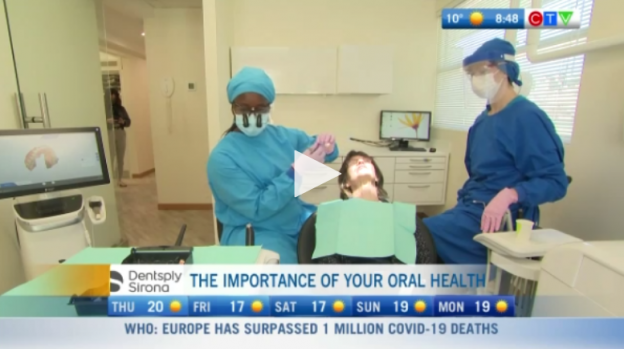Dental Hygiene and Prevention
Dental Hygiene and Prevention
- Dental Hygiene and Prevention
- Dental Exams & Dental Hygiene
- Digital Dental X-Rays
- Home Care (Tooth Brushing, Flossing, Rinsing)
- Proper Tooth Brushing Technique
- Proper Flossing Technique
- Oral Cancer Screening
- Fillings
Dental Hygiene and Prevention
Dental Hygiene procedures such as scaling, root planning and polishing are done by our registered dental hygienists. At Meadows Dental Group, your Dental Hygiene appointment will include dental exam and:
- Removal of tartar: Calculus or tartar is hardened plaque formed above and below the gum line and is firmly attached. It can be removed with the use of appropriate dental instruments.
- Removal of plaque: Plaque, on the other hand, is an almost invisible sticky film on the teeth. It is a growing colony of living bacteria, food debris and saliva. The bacteria are known to produce toxins that inflame the gums indicating the start of periodontal disease and that can affect your health.
- Teeth polishing: To remove stains and plaque that cannot be otherwise removed during tooth brushing and scaling.
Dental Examinations and Dental Hygiene
When you first visit us, a complete dental examination will be carried out by our dentist. We will conduct:
- Radiographs/diagnostic X-Rays: This helps determine cysts, bone loss, tooth position, decay and tumours.
- Oral cancer screening: Check your face, lips, tongue, tissues, throat and gums for signs of oral cancer.
- Evaluation for gum disease: Examine bones and gum around your teeth for signs of periodontal problems.
- Tooth surface examination: Check for decay with dental instruments.
- Existing restoration examination: Check veneers, crowns and fillings.
Digital Dental X-Rays in Pitt Meadows
Sometimes, valuable information may not be visible during a regular dental examination; that is when dental radiographs (X-rays) are essential because they are preventative and diagnostic tools. At Meadows Dental Group, our dentists and dental hygienists use this information to detect hidden dental abnormalities and suggest an accurate treatment plan. X-rays are recommended to avoid problem areas going undetected because these X-rays can reveal:
- Bone loss
- Cancerous and non-cancerous tumours
- Cysts or abscesses
- Teeth decay
- Root positions and unhealthy teeth
- Developmental abnormalities
- Internal tooth and gum line problems
Treating dental issues at an early stage can save you money, time, from unnecessary discomfort and your teeth.
Are Dental X-Rays Safe?
The radiation exposure of X-rays is equal to the amount of radiation one receives from natural sources in one day.
Dental X-rays are considered safe because they emit a low level of radiation. At our office, we take necessary measures to ensure limited exposure and keep your body protected by using lead apron shields. Digital X-rays are also known as digital radiography. This is the latest method in dental X-ray technology. Using a digital image capture device instead of an X-ray film saves time and also produces images that have a better resolution when compared to dental X-ray machines.
How Often Should Dental X-rays Be Taken?
At Meadows Dental Group, we will take into account the following prior to recommending a dental X-ray:
- Medical and dental history
- Dental exam
- Risk for disease
- Signs and symptoms
- Age
Please note that the need for dental X-rays depends on your individual needs.
Home Care
Our team is committed to giving you a healthy and beautiful smile that lasts forever. Therefore, along with visiting your dentist regularly, we also recommend you to take care of your oral health at home as well. You can start by having healthy and balanced meals, reducing frequent snacking, and by properly using dental aids such as toothbrush and floss, to reduce the risk of plaque and dental issue causing bacteria.
Below are some of the tips which can help you take care of your oral health in a better way:
Tooth Brushing
You should brush your teeth at least twice a day, and more importantly before going to bed. The brush used should have soft bristles and CDA (Canadian Dental Association) approved, along with toothpaste. We recommend you to follow the below steps for a proper brushing experience:
- You should place the brush at 45-degree angle to your gum and move the brush in a small circular motion. It should also be ensured that the bristles should always touch your gums while brushing
- Make sure to brush the outer, inner, as well as the biting surface of each of the tooth
- Clean the inside of your front teeth with the help of the tip of your brush
- Don’t forget to brush your tongue to remove bacteria, and freshen up your breath
We recommend electric toothbrush as well. It’s easy to use and can remove plaque effectively. It can simply be placed on your teeth and gums and can clean several teeth at a time.
Flossing
To clean in-between teeth and below the gum line, daily flossing is recommended. With the help of flossing, it becomes possible to clean difficult-to-reach spaces in the mouth and prevent plaque buildup.
You can follow the below steps for effective flossing:
- For flossing take about 30-40 centimetres (12-16 inches) of dental floss. Wrap it around your middle fingers and leave about 5-centimetres (2 inches) of the floss in between your hands.
- With the help of your thumbs and forefingers guide and gently insert the floss in-between your teeth in a gentle sawing manner
- Then make the floss into a “C” shape around each of the teeth and also under the gum line. Now move the floss up and down, so that the side of each tooth is clean too.
We recommend floss holders if you have difficulty in using conventional floss.
Rinsing
Rinsing your mouth properly with water after brushing and after meals is important. If you are using any kind of rinsing liquid for rinsing your mouth it’s always recommended to consult your Meadows Dental Group dentist or dental hygienist, to learn if it’s right for you or not.
If required, our dentists and dental hygienists can also recommend the following:
- Interdental brushes
- Tongue cleaners
- Medicated rinses
- Irrigation devices
- Rubber tip stimulators
- Fluoride
Oral Cancer Screening in Pitt Meadows
Your Meadows Dental Group dentist may screen you for oral cancer even if you do not have symptoms. Screening test are useful as they can help detect oral cancers early, decreasing the chance of fatality due to these cancers. For most types of cancer, odds of survival are greatly increased if diagnosed at an early stage.
Your dentist may examine you for lesions in the mouth, lips, hard palate, gums, tongue and mucous membranes. If lesions are detected, a variety of screening methods may be used to further investigate such as:
- Biopsy – a small excision of the suspicious tissue is made and sent for microscopic examination. Speak to your dentist for options on biopsy and treatment in Pitt Meadows.
- Exfoliative cytology – cells are obtained by means of scraping or smearing and examined.
- Imaging tests such as X-rays, ultra sounds, or MRIs X-rays, ultrasounds and magnetic resonance imaging (MRI) are other, and possibly less invasive, methods of detecting oral cancer that involve using radio wave energy to view possible subsurface masses and lesions.
- Toluidine blue (vital staining) – This procedure involves wiping the suspicious mucosal area and applying Toluidine blue solution, which is a type of stain that colors abnormal cellular surfaces.
Dental Fillings in Pitt Meadows
When decay rots away enamel, it will result in a cavity. If it is left untreated for a long time, it can eventually cause extensive damage and infection to your teeth and its root. However, our dentists at Meadows Dental Group can treat your cavity in one appointment with a simple dental filling, if the cavity is caught early.
During the appointment, we will first apply a local anesthetic and then use a drill to remove the decay. Once we remove the decay, we will apply fillings to prevent any further decay and also to prevent the sensitive inner layers of the tooth from cold, heat, or pressure. Our fillings include both silver amalgam fillings and tooth-coloured composite fillings. If you’re experiencing discomfort and to get relief from the discomfort with ease, get in touch with our dentists to discuss which fillings may be more suitable for you, or any preferences you may have for your situation.












